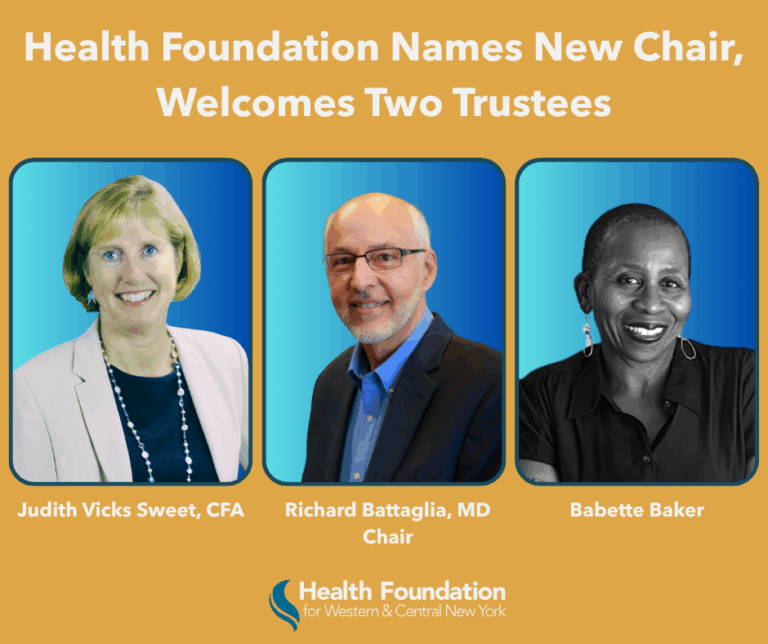Sometimes all it takes is unlimited imagination and a focused investment of energy to bring a transformative idea to life. In 2020 the Health Foundation awarded a Health Leadership Fellows CALL (Collaboration, Alignment, Leveraging Leadership) to Action grant to Healthy Community Alliance (HCA), a rural network serving Cattaraugus County and parts of Chautauqua, Erie, and Wyoming counties in New York. At the time, HCA was the grant lead for the CBO Consortium of Upstate New York. (CBO stands for community-based organization.)
“CBOs wanted improvements in referral and service coordination through technology, in a way that would have a lasting impact on our community members who are most in need,” explains Ann Battaglia, HCA’s chief executive officer.
The idea was to improve connections to critical health and human services, in a trauma-informed way. This would reduce the need for community members to keep disclosing the same personal information when contacting different organizations for services.
The grant funded a pilot project focused on connecting health and social care data to address the social determinants of health, such as food insecurity, housing, access to education, and employment status. HCA partnered with wellconnected, a technology startup in western New York, to test the prototype for a new software platform. Cofounders Jamie Bono and Duane Conners both had experience in health care technology. Local CBOs brought sector-specific insight on functionality to improve user and community member experience as well as data gathering and outcome tracking.
The team partnered with 211 WNY to curate and maintain a service directory as part of a digital Community Information Exchange (CIE). The goal was to enable social and health care providers to close the loop quickly and easily when referring community members to resources for housing, food, parenting, caregiving, employment, and other areas.
Today, the platform—allco (as in “all community”)—is wellconnected’s flagship product and an interoperable and scalable tool used in numerous regions. For each one, allco embeds the region’s 211 resource directory to share information about community-based organizations (CBO) with providers through a closed-loop referral system.
Here’s a typical use case:
Pamela Green, a single mom insured by Medicaid, lives with her two young children in Chautauqua County. During a recent clinical visit, her provider notes that she’s exhausted and a little anemic. A brief exchange reveals that she’s feeling overwhelmed by the demands of parenting. In addition to recommending iron supplements, her provider decides to refer Pamela to Strong Starts, a community organization that offers a variety of free resources for families. The provider creates a referral in allco, and after Pamela returns home, she receives an invitation from the organization to discuss their services. A few days later, the provider checks allco to confirm that Pamela followed up on the referral and to read the case notes inputted by the organization.
Four years after the pilot launch, there are now nearly 200 agencies on wellconnected’s allco platform and over a thousand users. allco has also expanded its geographic reach to include Western New York, Southern Tier, Hudson Valley, Mohawk Valley, Long Island, and Adirondack region. Plans to pursue projects in central New York are already under way.
In 2023 wellconnected signed a multiyear contract with Independent Health, one of western New York’s largest health insurers. Independent Health will use allco to connect its members with food and nutritional assistance, housing assistance, transportation services, workforce development support, mental health counseling, and other community resources.
wellconnected also recently partnered with Peaceprints of Western New York and the Erie County Sheriff’s Office for Project Blue, which helps formerly incarcerated individuals reenter society. Using the allco platform, program administrators are able to connect these individuals with a host of community resources, including housing, education, and workforce development.
Duane Conners explains that workforce development is an area of particular growth right now. “We have longitudinal records. We have the ability to help workforce development programs connect to each other, understand certifications, and get folks referred into staffing agencies.”
At the Health Foundation, we believe progress in health care requires a commitment to continual innovation and integrated approaches. We welcome solutions that reinforce a holistic view of individual well-being, can connect vital data related to health and social care, and break down the everyday barriers to health equity.
The improved connections between social care and health care providers that grew out of HCA’s project several years ago exemplify the kind of collaboration highlighted in our strategic plan. We’ll continue working to help CBOs and health systems become more collaborative and sustainable.



